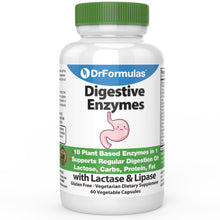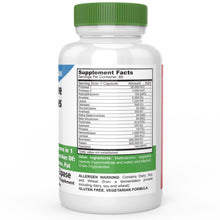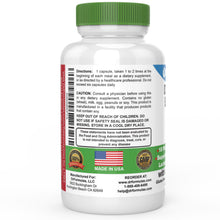DrFormulas Digestive Enzymes to Support Digestion with Gall Bladder and Pancreatic Enzymes with Lipase, Amylase, Bromelain, Protease for Bloating Relief, Gas, Lactose Intolerance, 60 Capsules
Regular price
$16.99
$13.57
Sale
- DrFormulas Digestive Enzymes Supplement features 18 different kinds of digestive enzymes to help you digest certain kinds of foods and reduce gas and bloating
- Gas and bloating is a problem of having undigested and unabsorbed food. Digestive enzymes help your body break down and absorb food. Problems arise when gall bladders are removed or the pancreas doesn't produce enough digestive enzymes to support digestion.
- It features 18 different kinds of enzymes such as lipase, amylase, bromelain & more.
- 60 capsules. Does not contain artificial colors and flavors, chemical preservatives, or gluten.
- Made in the USA in a FDA inspected Good Manufacturing Practices facility.
- Satisfaction Guaranteed or Your Money Back!
A Note on Gluten/Dairy/Soy Content
DrFormulas Digestive Enzymes are created from a fermentation process involving dairy, soy and wheat. The reason why we can claim that the formula is gluten free is because of the way digestive enzymes work.
Some of the enzymes are produced in a medium using wheat products but when the enzymes are extracted and mixed together, they digest and break down the gluten protein into its amino acid building blocks so it is no longer recognized as a gluten protein.
Gluten is a protein that is broken down by protein digestive enzymes (more specifically called proteases), which this product contains.
Digestive Enzyme Supplements
Digestive enzymes are proteins produced by the body that help break down food into nutrients that are easily absorbed by the body. Without these nutrients your body would not have the energy and raw materials it needs to produce cells and tissues and protect your immune system. If you have insufficient digestive enzymes in your body, you will be unable to break food down into its nutrient components, which may result in health issues like food intolerances (for example lactose intolerance), bloating, and stool issues. A lack of digestive enzymes can also result in nutrient malabsorption wherein your body is not absorbing enough vitamins, minerals, and nutrients from food, leading to a variety of illnesses and disorders.13
Taking a digestive enzyme supplement is a great way to support your digestive health. Natural digestive enzymes can make meals more comfortable and may improve your overall health. You should take an enzyme supplement just before you eat to obtain the maximum benefits.
Lactose Intolerance Pills
As we age, our bodies produce less and less enzymes, and sometimes require enzyme supplementation to help digest foods that we had no problems with before. For example, when we are young, our bodies produce more of the enzyme lactase, which breaks down the milk sugar lactose. As we age, our bodies produce less of it and are soon unable to digest lactose, leading to a condition called lactose intolerance.
Lactose intolerance affects around 30 million American people over the age of 20. Symptoms usually include diarrhea, abdominal cramps, gas, and bloating, though in rare instances, you may experience nausea and vomiting.1 Symptoms can last anywhere between 30 minutes to 2 hours after ingesting lactose-containing dairy products. If you are lactose intolerant, but you don’t want to have to avoid eating dairy products, the best solution is to take a daily digestive enzyme supplement with lactase. Lactase is the enzyme that breaks down lactose.
What Exactly Is In Our 18 Digestive Enzyme Supplement?
DrFormulas® Digestive Enzymes with Lactase and Lipase has been formulated to cover all bases in terms of digestive enzymes. It is a proprietary blend of 18 different enzymes. We only use the best digestive enzymes from natural sources. Each capsule contains enough enzymes to help digest up to 30 grams of carbohydrates (including lactose), 15 grams of protein, and 15 grams of fat. Here are the ingredients that make this possible:
Protease 1 and 2
Proteolytic enzymes, also known as proteases, proteinases, or peptidases, are normally produced in the pancreas and stomach and play a variety of roles in the human body. They can also be found naturally in certain foods, such as pineapples and papayas.14 Proteases are enzymes that break down protein in food.2 Proteins are made of amino acids, and are vital for cellular functions, repairing body tissue, normal growth, and providing the body with sources of energy.
Lactase
The main reason most people cannot digest lactose is because they are deficient in the lactase enzyme, the compound responsible for breaking down lactose, the sugar found in milk and other dairy products. Supplemental lactase pills support healthy lactose digestion by adding the missing enzyme to your diet.3
Amylase
Amylase is another digestive enzyme. Amylase supplements help with the breakdown of carbohydrates in your mouth and stomach.4 Amylase is also produced in the pancreas and released into the small intestine where it continues to break down carbs. Specifically, amylase enzymes break down the bonds in starches and glycogen, a starch-related polysaccharide, turning them into simpler sugars, like glucose and maltose. Enzymes included in the amylase group are defined by their actions only on oligosaccharides from starches.15
Lipase
Lipase is a digestive enzyme required to break down fats (lipids) in one’s diet. If fats are not sufficiently digested, they may coat other food components, such as proteins and carbohydrates, and interfere with their digestion. Bile, which is produced in the liver and supplied via the gallbladder, assists lipase with the healthy digestion of lipids. Lipase may also help support the digestion of lactose.5 Lipase supplements play the important role of breaking down fats into fatty acids and mobilizing the triglycerides (the main constituents in natural fats and oils) stored in the body. Lipase in the body is derived naturally from cells in the pancreas, liver, stomach, and muscle tissue.16
Invertase
Invertase is a yeast-derived, carbohydrate-digesting enzyme. It breaks sucrose down into fructose and glucose.6 A digestive supplement containing invertase, along with other enzymes, may help support a healthy metabolism of lactose.7
Catalase
Catalase is an antioxidant enzyme that is vital for good health. Its function is to convert hydrogen peroxide (a product of cell metabolism and cause of free radical damage) into neutral oxygen and water thereby preventing its breakdown into a hydroxyl radical or other toxin.18 In doing so, it may also be able to protect DNA against damage and support healthy aging.8 Catalase is found in all aerobic organisms and is present in nearly all mammalian tissue. In humans, the liver cells and erythrocytes show the highest catalase activity.
Beta-Glucanase
This carbohydrate-digesting enzyme may help support the health of the digestive tract by acting as bulk-forming fiber and improving the digestion of grains such as rye, barley, and wheat.9 Beta-glucanase helps to break down glycosidic bonds in beta-glucan, a major polysaccharide component found primarily in the cell walls of plants and certain groups of fungi.19
Bromelain
Bromelain is an enzyme extracted from the pineapple plant. Bromelain is actually a mixture of endopeptidases and other compounds, including glucosidase, phosphatase, cellulase, and escharase. Studies show that bromelain possesses anti-inflammatory properties.10 It may also help with the absorption of prescription medication, particularly antibiotics.20
Bromelain supplements can be used to reduce muscle soreness, nasal swelling and inflammation, osteoarthritis, and allergies. Topical bromelain has been prescribed for soothing wounds and burns.21
Papain
Papain is an enzyme extracted from the papaya fruit. Papain is another protein-digesting enzyme and is one of the best for breaking down the proteins in meat. It functions by breaking down the bond in proteins and reducing them to individual amino acids, so they can be used in your body for tissue growth and repair.12 Papain has also been studied for its ability to reduce inflammation and relieve pain, while topical forms have been found to encourage wound healing.22
Aspergillopepsin
Aspergillopepsin, also known as aspergilloglutamic peptidase, breaks down proteins, particularly gluten. Gluten allergies, often a result of celiac disease, have become increasingly common. While a gluten-free diet is still the best way to avoid the potential side effects associated with a gluten allergy, accidental ingestion of food containing gluten is common, resulting in a potential relapse. Studies show that aspergillpepsin may present effective gluten detoxification properties. While clinical research is still necessary to determine the exact dosage ratios necessary, aspergillopepsin may be helpful in providing near-term relief for those with gluten sensitivities who experience inadvertent gluten exposure.23
While DrFormulas® Digestive Enzymes are produced using a process that involves wheat, our potent purification process and ensures that the product is gluten free.
Cellulase
Cellulase breaks down cellulose, the main component found in the cell walls of plants, into glucose and other simple sugars that provide fuel for your body. Humans naturally lack the ability to digest cellulose fiber.24 While dietary fiber is important to health and known to feed gut bacteria and provide a wide range of potential benefits, lacking cellulase often means that humans are unable to make the most effective use of fruits and vegetables. Cellulase works by hydrolyzing cellulose into smaller, more digestible subunits.34
Glucoamylase
Glucoamylase (alternately known as amyloglucosidase) breaks down starches to release glucose and other sugars. This enzyme is obtained via the controlled fermentation of a fungus known as Aspergillus niger.25
Alpha Glactosidase
Alpha galactosidase breaks down complex carbohydrates and may reduce intestinal gas production, which may help to relieve bloating and abdominal discomfort.26 Studies show that alpha-galactosidase works by breaking down saccharides (sugars) that are commonly found in plants and legumes. Humans generally do not produce enough of this enzyme in their gastrointestinal tracts to properly break down these saccharides, which results in indigestion, gas, and abdominal discomfort. Supplementing your diet with alpha galactosidase may allow for better digestion of plant-based saccharides to provide more intestinal comfort.35
Pectinase
Pectinase refers to a group of digestive enzymes that assists in the digestion of pectin, a polysaccharide commonly found in cell walls of higher plants.27
Xylanase
Xylanases refer to a group of glycoside hydrolase enzymes known to assist in the breakdown of xylan, the second most abundant polysaccharide that is also a common component of plant cell walls. While xylanase enzymes are produced by a variety of specimens, including bacteria, yeast, insects, and certain marine algae, commercial sources of xylanase usually come from filamentous fungi. Similar to other enzymes designed to break down plant cell walls, xylanase is not produced within human digestive systems. By incorporating this digestive enzyme into your diet, you can better digest plant material, which may then result in increased availability and absorption of nutrients within plant-based foods. Xylanase may also help to prevent gas, bloating, and other forms of intestinal discomfort that can come from improper digestion of foods containing xylan.28
Phytase
Phytase works to hydrolyze phytic acid, a compound commonly found in grains, cereals, and legumes, to turn it into a usable form of inorganic phosphorous.29 Phytic acid is considered an anti-nutritional factor that can reduce your ability to absorb nutrients found in cereal grains. Phytic acid may impair the absorption of zinc, iron, and calcium, which may contribute to mineral deficiencies over time.36 Phytase is essential to reducing and breaking down excess phytic acid to allow for the release of nutrients.33
Hemicellulase
Hemicellulase is designed to break down the non-digestible carbohydrate hemicellulose, a form of cellulose that is also a prominent component in cell walls. This makes hemicellulase a key player in the digestion of fiber.30 Animal studies have found that hemicellulase supplementation increased nutrient digestibility to support overall health.32
Peptidase
Peptidase is an enzyme that breaks down proteins. Exo-peptidases break down the terminal bonds in proteins to release amino acids, while endo-peptidases break proteins down into shorter peptide fragments. Working synergistically with other enzymes, peptidase can help in the digestion of proteins found in cheese, eggs, meat, nuts, and legumes.31
Sources:
- http://www.mayoclinic.org/diseases-conditions/lactose-intolerance/basics/definition/con-20027906
- https://clinicaltrials.gov/ct2/show/NCT01729793
- http://pediatrics.aappublications.org/content/118/3/1279.short
- http://www.sciencedirect.com/science/article/pii/0016508586904361
- https://www.ncbi.nlm.nih.gov/pubmed/19152478
- https://issuu.com/lawrencekokwingkhong/docs/expt1
- https://www.ncbi.nlm.nih.gov/pmc/articles/PMC1243355/pdf/biochemj00809-0191.pdf
- https://www.ncbi.nlm.nih.gov/pubmed/16563232
- https://www.globalhealingcenter.com/natural-health/beta-glucanase/
- https://www.ncbi.nlm.nih.gov/pubmed/28065968
- http://www.sciencedirect.com/science/article/pii/S1567576903002972
- http://www.uofmhealth.org/health-library/hn-2840008
- https://gut.bmj.com/content/54/suppl_6/1.full
- https://www.healthline.com/nutrition/proteolytic-enzymes
- https://www.sciencedirect.com/topics/neuroscience/amylase
- https://www.sciencedirect.com/topics/biochemistry-genetics-and-molecular-biology/lipase
- https://www.sciencedirect.com/science/article/pii/S0974694313002934
- https://www.sciencedirect.com/topics/medicine-and-dentistry/catalase
- https://www.sciencedirect.com/topics/agricultural-and-biological-sciences/glucanase
- https://www.ncbi.nlm.nih.gov/pmc/articles/PMC3529416/
- https://nccih.nih.gov/health/bromelain
- https://www.verywellhealth.com/the-benefits-of-papain-89493
- https://journals.plos.org/plosone/article?id=10.1371/journal.pone.0006313
- https://www.sciencedirect.com/topics/biochemistry-genetics-and-molecular-biology/cellulase
- https://enzymeeducationinstitute.com/enzymes/glucoamylase/
- https://www.ncbi.nlm.nih.gov/pubmed/17151807
- https://www.sciencedirect.com/topics/biochemistry-genetics-and-molecular-biology/pectinase
- https://www.sciencedirect.com/topics/biochemistry-genetics-and-molecular-biology/xylanase
- https://www.sciencedirect.com/topics/agricultural-and-biological-sciences/phytase
- https://enzymeeducationinstitute.com/enzymes/hemicellulase/
- https://enzymeeducationinstitute.com/enzymes/peptidase/
- http://www.ibna.ro/arhiva/AZ%204/AZ%204_05%20Monica%20Parvu.pdf
- http://www.balancedconcepts.net/phytates.pdf
- http://worldofenzymes.info/enzymes-introduction/cellulase/
- https://www.sciencedirect.com/topics/agricultural-and-biological-sciences/alpha-galactosidase
- https://www.healthline.com/nutrition/phytic-acid-101
REALLY CLEARS THE BLOAT, WILL CONTINUE TO BUY.
Warks. Great
This product actually works !!
Product really helps with digestion.
DrFormulas Digestive Enzymes to Support Digestion with Gall Bladder and Pancreatic Enzymes with Lipase, Amylase, Bromelain, Protease for Bloating Relief, Gas, Lactose Intolerance, 60 Capsules






